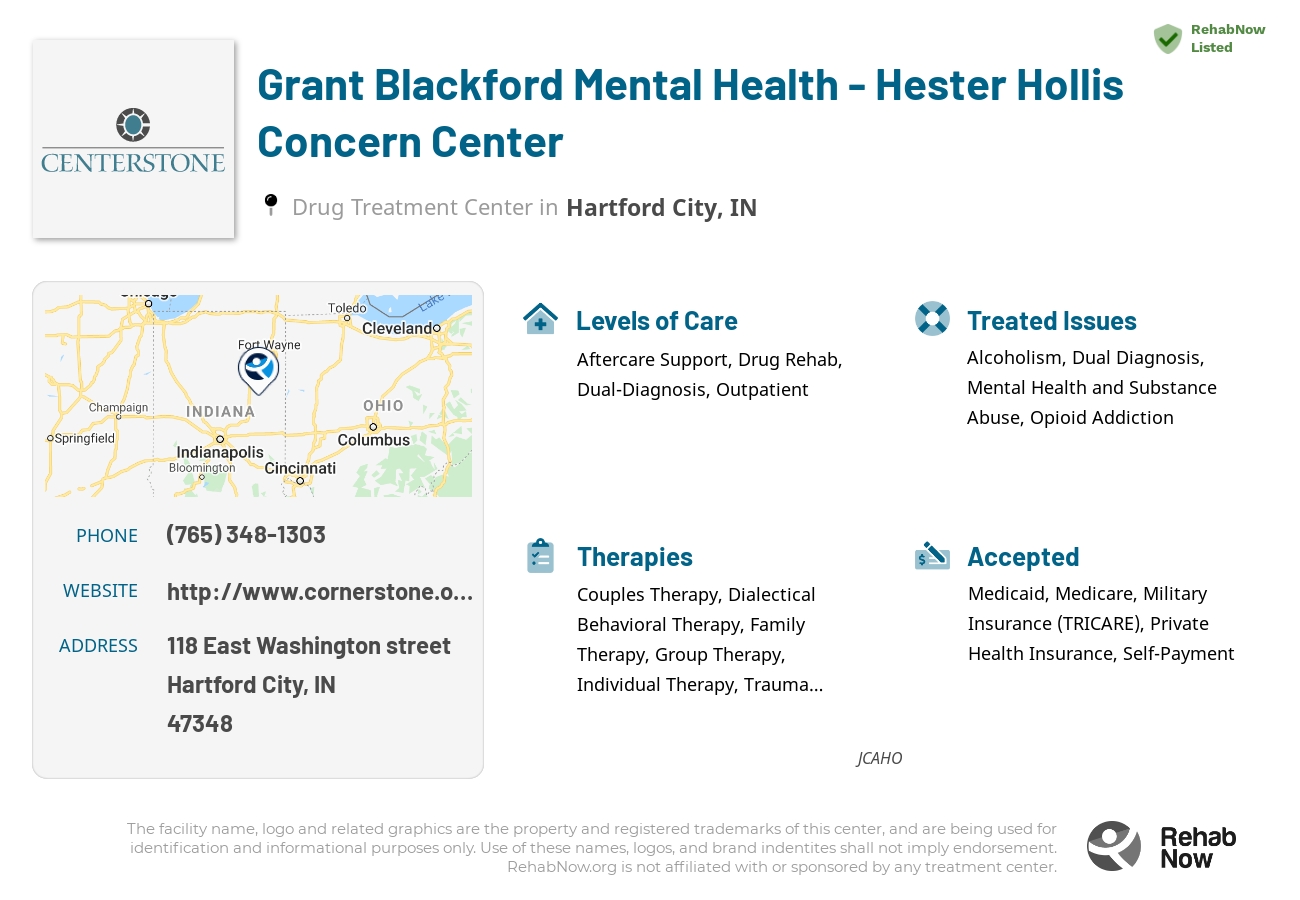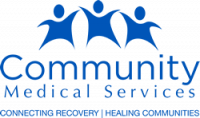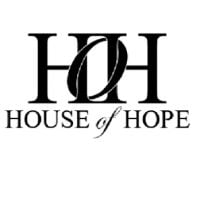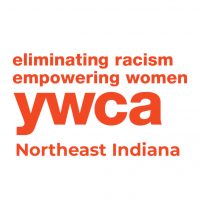Grant Blackford Mental Health - Hester Hollis Concern Center
Drug Rehab Center in Hartford City, Indiana
Hester Hollis Concern Center in Hartford City, IN is a Joint Commission accredited Addiction Treatment Facility providing private health insurance-accepting Aftercare Support, Drug Rehab, Dual-Diagnosis, and Outpatient Levels of Care to individuals suffering from Alcoholism, Opioid Addiction, Dual Diagnosis, and Drug Addiction.
About This Indiana Facility
Grant Blackford Mental Health – Hester Hollis Concern Center in Hartford City, Indiana, specializes in dual diagnosis treatment, seamlessly integrating addiction services with mental health support. Notably, its comprehensive care model includes mental health assessments, counseling, and personalized treatment plans. The center stands out due to its focus on both substance use disorders and co-occurring mental health issues, offering a holistic approach to recovery.
- Dual Diagnosis Treatment: Addresses both addiction and co-occurring mental health disorders, employing evidence-based therapies.
- Intensive Outpatient Program (IOP): Provides flexible yet intensive therapy sessions, ideal for those needing treatment while managing daily responsibilities.
- Peer Support Meetings: Facilitates recovery through shared experiences and support, including 12-Step groups like Narcotics Anonymous and Alcoholics Anonymous.
Accredited by the Joint Commission on Accreditation of Healthcare Organizations (JCAHO), this facility adheres to high standards of care. The center’s affiliation with Cornerstone Behavioral Health and acceptance of private insurance make its comprehensive services accessible to a wider community, reinforcing its commitment to changing lives through specialized care.
The center effectively treats a range of addictions including alcoholism and opioid addiction, employing a variety of methods such as individual and group counseling, educational workshops, and aftercare support. The levels of care offered, from mental health assessments to intensive outpatient programs, cater to the unique needs of individuals over the age of 18.
Genders
Ages
Modality
Additional
Accreditations

JCAHO
Conditions and Issues Treated
Opioid abuse has become a national epidemic in the last decade. The US has one of the world’s highest rates of opioid use and abuse, as well as opioid-related deaths. Opioids are classified as Schedule II-IV controlled substances in the US due to their high potential for abuse.
Oxycodone, hydrocodone, methadone, and fentanyl are the most common Opioids and are commonly prescribed to treat pain. Tolerance to opioids develops over time, making life difficult, if not impossible, without them. Opioid users often obtain the drugs illegally. They can be drug dealers, friends, or family members who do not have valid prescriptions.
The desire for a more intense high than prescription opioids can quickly lead to heroin use. Heroin users are more prone to illness and death due to the high risk of overdose.
Many opioid addicts who seek treatment believe that the only way to overcome their addiction is through medical detox and long-term drug addiction rehab. To help patients wean off their addiction and reduce the risk of overdose, medication-assisted therapy (MAT) involves prescribing a replacement opioid. Doctors use MAT in conjunction with other anti-craving medications to help patients maintain recovery. Due to the high risk of relapse, MAT is often combined with individual and group counseling and social support programs.
When addiction and psychiatric issues co-occur, the addict’s recovery is more successful when both conditions are treated. A dual diagnosis refers to a condition in which the patient is diagnosed with two health issues: addiction and bipolar disorder. The most common therapies are psychotherapy, behavioral therapy, spiritual counseling, 12-step programs, and medication management.
Levels of Care Offered at Grant Blackford Mental Health - Hester Hollis Concern Center
This center offers a variety of custom treatment tailored to individual recovery. Currently available are Aftercare Support, Drug Rehab, Dual-Diagnosis, Outpatient, with additional therapies available as listed below.
An outpatient treatment program is set up to help with alcohol or drug addiction or a co-occurring disorder. The patient must attend the facility for their therapy and other programs but can return home each night.
The frequency of mandatory attendance decreases after much of Grant Blackford Mental Health - Hester Hollis Concern Center‘s program is complete.
Outpatient treatment is a recovery approach that allows recovering addicts to live at home while getting rehab for addiction
An outpatient can include day treatments which include attending group sessions one hour per week. A person living in an outpatient environment may be allowed the opportunity to work full time if they choose to and continue studies without interruption from drugs/alcohol.
Outpatient treatment is an option for people who want to maintain their careers and families. Outpatients live at home but attend treatment such as individual counseling, group counseling, or twelve-step meetings during the day.
Aftercare support is vital to the success of someone in drug or alcohol treatment. It involves assisting with entering a sober living home, getting career counseling or educational assistance and even getting the individual lined up with programs like AA and NA. This support helps recovering addicts readjust to normal day-to-day activities and maintain sobriety.
When a person is in drug or alcohol treatment, they have to increase their focus on themselves. They need to learn how to recognize the triggers that cause them to relapse and learn the habits that would benefit them if they were to be sober. This is all part of the growth in recovery, and aftercare is essential to that process.
Therapies & Programs
At Grant Blackford Mental Health - Hester Hollis Concern Center , to learn from past mistakes and improve one’s situation, the recovering person meets individually with a therapist. The counselor or therapist will address addiction causes, triggers, mental issues, dual diagnosis, and aftercare plans during this time. This is a very intense and challenging process. Some clients find it easier to open up to someone other than family or friends who understand their struggles with addiction.
Couples therapy sessions are typically used to help couples in recovery from drug addiction work through their issues. These types of sessions can be beneficial for many reasons, including the fact that they add a layer of accountability when both partners in a couple are recovering from addiction.
Therapy can also provide addicts with another effective way to cope with stress and avoid relapse during difficult situations. This type of therapy can help improve communication with their partners, which can strengthen the relationship and prevent future problems that might lead to relapse.
Family therapy is a crucial part of drug treatment and getting sober. It is one of the most effective ways to help addicts stay on the path to long-term sobriety. An addict’s family can play a vital part in helping them to avoid relapse. They can spot the warning signs and help them get back on track.
In group therapy, recovering addicts meet with a therapist and other people in recovery. Some groups are closed, meaning only people who share the same addiction or problem can attend. Others are open to anyone who wants to stop using drugs or drinking alcohol. Group therapy sessions typically focus on one topic each week or month so that recovering addicts can discuss issues they face daily.
Trauma therapy allows people to face and learn from past traumas.
Many people suffer childhood traumas that lead to adult addiction. During treatment at Grant Blackford Mental Health - Hester Hollis Concern Center [/type], you can move forward in your recovery and reclaim your sober future! Trauma is a common cause of psychological disorders like Addiction Disorder. It’s common in Addictive Disorders patients because traumatized people have strong emotions or thoughts that lead to addictive behaviors.
Dialectical Behavior Therapy (DBT) is a type of therapy created in the late 1980s and early 1990s. It was designed to help people with high rates of suicidal behavior.
The goal of DBT is to teach mindfulness, distress tolerance, emotion regulation, and interpersonal effectiveness to help people learn how to live a life that is no longer controlled by overwhelming emotions and urges.
DBT is beneficial in treating drug addiction because it helps patients understand and cope with their cravings for drugs or alcohol rather than turning to those substances as a way of coping.
Cognitive Behavioral Therapy (CBT) is based on the idea that how we feel, think and act all interact together. It helps people explore their thoughts for problems (or false beliefs) that influence their mood and actions. CBT is very goal-oriented, which means that the therapist and patient work together on a specific problem. In addition to helping a client focus on thoughts that can be changed, CBT also allows them to take an active role in their treatment. Our thoughts determine our feelings and behaviors; our feelings affect our thoughts, and our behaviors change our thoughts and feelings.
Payment Options Accepted
For specific insurance or payment methods please contact us.
Is your insurance accepted?
Ask an expert, call (888) 674-0062
Cornerstone Behavioral Health Associated Centers
Discover treatment facilities under the same provider.
- Cornerstone Behavioral Health in Marion, IN
- Grant Blackford Mental Health - Keystone Family Resource Center in Marion, IN
- Grant Blackford Mental Health - Milestone Addiction Services in Marion, IN
Learn More About Cornerstone Behavioral Health Centers
Additional Details
Specifics, location, and helpful extra information.
Hartford City, Indiana 47348 Phone Number(765) 348-1303 Meta DetailsUpdated April 15, 2024
Staff Verified
Patient Reviews
There are no reviews yet. Be the first one to write one.
Hartford City, Indiana Addiction Information
The state of Indiana ranks 14th in the nation for drug abuse, but 17th for drug overdoses. The state has many high-quality rehabilitation centers, but reports show that there are about 20 deaths per 100,000 people. This is due to its location making it a drug trafficking haven, where many drugs are further distributed into the country.
Treatment in Nearby Cities
- Michigan City, IN ( mi.)
- Knox, IN (88.0 mi.)
- Edinburgh, IN (82.3 mi.)
- Plainfield, IN (75.2 mi.)
- Seymour, IN (106.9 mi.)
Centers near Grant Blackford Mental Health - Hester Hollis Concern Center
The facility name, logo and brand are the property and registered trademarks of Grant Blackford Mental Health - Hester Hollis Concern Center, and are being used for identification and informational purposes only. Use of these names, logos and brands shall not imply endorsement. RehabNow.org is not affiliated with or sponsored by Grant Blackford Mental Health - Hester Hollis Concern Center.







